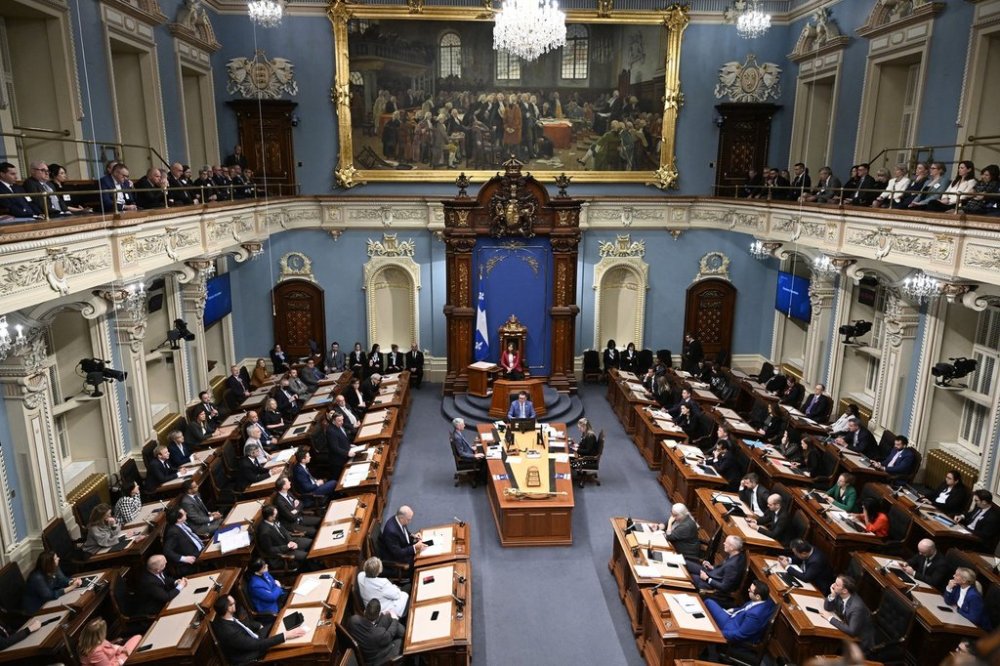Quebec committee to look at how to strengthen secularism, possible public prayer ban
Advertisement
Read this article for free:
or
Already have an account? Log in here »
To continue reading, please subscribe:
Monthly Digital Subscription
$0 for the first 4 weeks*
- Enjoy unlimited reading on winnipegfreepress.com
- Read the E-Edition, our digital replica newspaper
- Access News Break, our award-winning app
- Play interactive puzzles
*No charge for 4 weeks then price increases to the regular rate of $19.00 plus GST every four weeks. Offer available to new and qualified returning subscribers only. Cancel any time.
Monthly Digital Subscription
$4.75/week*
- Enjoy unlimited reading on winnipegfreepress.com
- Read the E-Edition, our digital replica newspaper
- Access News Break, our award-winning app
- Play interactive puzzles
*Billed as $19 plus GST every four weeks. Cancel any time.
To continue reading, please subscribe:
Add Free Press access to your Brandon Sun subscription for only an additional
$1 for the first 4 weeks*
*Your next subscription payment will increase by $1.00 and you will be charged $16.99 plus GST for four weeks. After four weeks, your payment will increase to $23.99 plus GST every four weeks.
Read unlimited articles for free today:
or
Already have an account? Log in here »
Hey there, time traveller!
This article was published 10/03/2025 (259 days ago), so information in it may no longer be current.
MONTREAL – The Quebec government has announced a new committee to make recommendations on how to strengthen secularism in the province, including by possibly restricting public prayer.
Amid a flurry of concern over religious practices emerging in Quebec public schools, Secularism Minister Jean-François Roberge said the committee will “document the phenomenon of infiltration of religious influences” in all public institutions.
He said the committee will also look at what can be done to prevent people from praying in public streets and parks, including during protests — something Quebec Premier François Legault has said he wants to ban.

Roberge said the committee’s recommendations could lead to changes to Quebec’s secularism law, Bill 21, or to new policies and regulations. Bill 21 bans public employees like teachers and police officers from wearing religious symbols on the job.
“We will do what is necessary to protect ourselves against religious influences and strengthen the secularism of the state,” Roberge said during a Monday news conference in Montreal.
He said the situation at Bedford elementary school in Montreal, where the government reported last fall on a toxic climate created by a group of teachers, was the “canary in the coal mine” that highlighted the need to study whether secularism rules are being respected.
A government report published last October found the group of teachers, many of North African descent, had imposed autocratic rule at the school. It found that teachers yelled at and humiliated students. Subjects like science and sex education were either ignored or barely taught, and girls were prevented from playing soccer.
“It was a wake-up call,” Roberge said. “There’s no smoke without fire.”
A subsequent investigation into 17 other Quebec schools found few breaches of the secularism law, but did note that some teachers are adjusting course material so as not to offend religious beliefs.
Those investigations have prompted Education Minister Bernard Drainville to promise new legislation to strengthen secularism in schools. He has suggested the religious symbols ban could be extended to school staff other than teachers.
On Monday, Roberge said Drainville will likely table his bill this spring. Meanwhile, the committee will complement Drainville’s work by examining all public institutions to determine if Bill 21 “is well-understood, is well-applied, both in its spirit and in its letter,” he said.
The committee will be headed by two lawyers: Christiane Pelchat, former president of Quebec’s council on the status of women, and Guillaume Rousseau, a law professor at Université de Sherbrooke.
They will study measures in place elsewhere in the world to reinforce state secularism, and will deliver a report by Aug. 20.
Roberge said they will go beyond public institutions to examine whether the government can take action on prayer in public places as well. He pointed to instances of Muslims blocking streets by kneeling to pray during pro-Palestinian protests in Montreal last year, which he said made people uneasy.
“Personally, I find that it is contrary to living together in harmony,” he said.
During a news conference last December, Legault said he was looking at ways to end prayer in public places.
Rousseau said the committee will also examine the clause of Bill 21 that exempts elements of Quebec’s cultural heritage. A crucifix at a city hall, for example, need not be removed according to the law. Instead, municipal governments can decide what to do about such religious symbols.
The committee will study whether that part of the law needs to be clarified, Rousseau said.
In January, the Supreme Court of Canada announced it will hear a legal challenge of Bill 21 brought by several groups that oppose the law. The federal government has filed a notice to intervene in that case in defence of freedom of religion.
Roberge said it’s a “shame” that Bill 21 is being challenged at the top court. “We are confident that at the end, the government of Quebec will win and Bill 21 will stand,” he said.
This report by The Canadian Press was first published March 10, 2025.
— With files from Stéphane Blais
The Free Press acknowledges the financial support it receives from members of the city’s faith community, which makes our coverage of religion possible.


